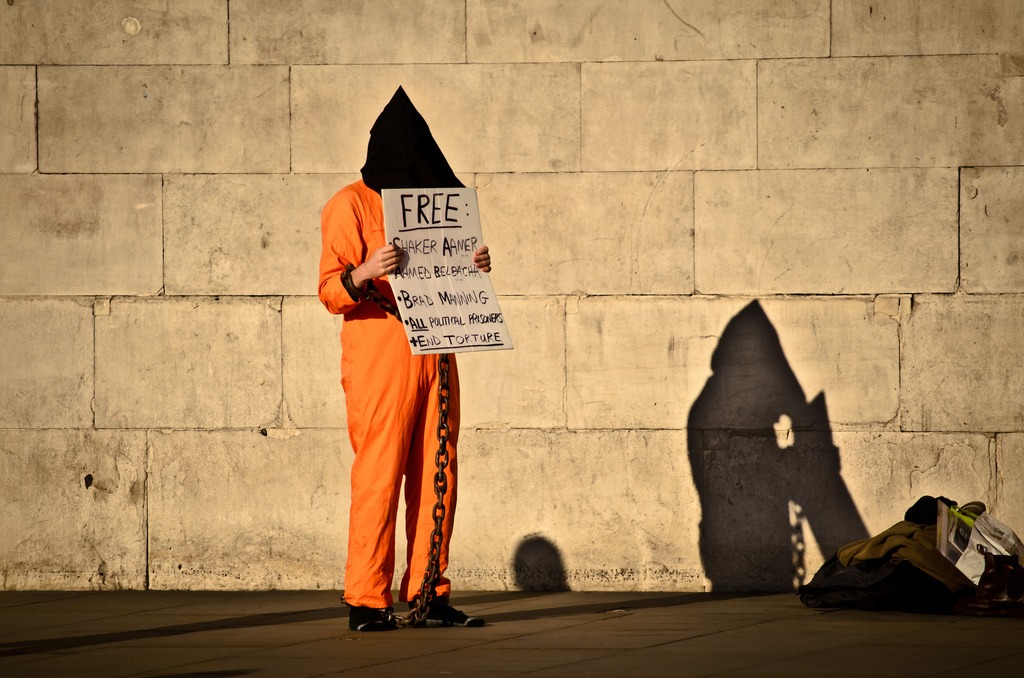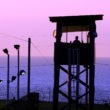Photo Credit: Garry Knight
The plan President Obama released in February, to close the 14-year-old prison at Guantánamo, leaves in place some of the most egregious practices devised during the Bush-Cheney administration.
Under Obama’s plan, there will be no end to military commissions, although the ongoing war-court trial (actually pre-trial) of Khalid Shaikh Mohammed and his four alleged 9/11 co-conspirators is now entering its fifth year with no trial date in sight. (See: “Trial Without End,” page 1.) In his plan, the president asks Congress to make some small changes in the Military Commissions Act, a recognition that the war trials are foundering.
The United States will continue to hold 24 “forever prisoners,” men charged with no crime, yet indefinitely incarcerated as prisoners of war in a “war on terror” that will not end in their lifetimes, a notion that defies our most fundamental constitutional guarantees and international law. As the plan describes cost savings over 20 years, it evidently envisions holding prisoners for an additional 20 years.
The president isn’t proposing to close Guantánamo, as much as he is proposing moving it to what Miami Herald reporter Carol Rosenberg calls “Guantánamo North”—continuing the same practices that are underway in Cuba at one of 13 U.S. sites considered in a preliminary survey. Three prospective locations are known: the U.S. Navy Brig in Charleston, South Carolina, the federal prison in Leavenworth, Kansas, and the U.S. “Super Max” prison in Florence, Colorado.
Progressives will see Obama’s plan to address the prison camp—located on the 45-square-mile naval base that the United States has “leased” since the 1903 Platt amendment stipulated terms for U.S. troops to end their occupation after the Spanish-American War—as a step in the right direction, even if typical of the incrementalism that has defined his presidency.
Closing the Guantánamo prison will, as Obama said, deprive terrorists and potential terrorists of a symbol of U.S. disregard for law, and the abusive treatment of prisoners, all of whom practice Islam.
The plan envisions expediting the release of 36 detainees who have been cleared for release but are stuck in the prison because of the difficulty of repatriating them or finding third countries to accept them. And it optimistically aims for a long-term prison population of approximately 30 men.
If moved to the United States, some of the prisoners not currently mired in the ongoing military commissions could be charged and tried in federal courts, or possibly agree to plea deals, bringing them out of the dark and into the American system of justice.
The Miami Herald’s Rosenberg reported that this was done once, when the United States moved former CIA prisoner Ahmed Ghailani from Guantánamo to New York. Ghailani was convicted for his role in the bombing of U.S. embassies in Kenya and Tanzania in a trial that lasted less than one month and is serving a sentence of life without the possibility or parole.
The Guantánamo plan would reduce the staff of 2,000 military and civilian employees who run what has frequently been described as the most costly prison in the world. With 22 guards and prison staff for each detainee, the cost per prisoner is $4.9 million a year. Super-maximum prisons in the United States spend $60,000 to $70,000 per year to house inmates, according to penologists cited in The Christian Science Monitor.
And as it appears that the military commissions will continue at “Guantánamo North,” a stateside location would improve the quality of “justice” for detainees. Defense attorneys often make two trips a month to meet with their clients, which entails going through Department of Defense channels to arrange visits, then booking a charter flight to the island. Hearings in Cuba require defense and prosecution attorneys to convene at Joint Air Base Andrews in Maryland, to fly to Cuba on a chartered 737.
The president’s plan is probably dead on arrival with the Republican-controlled Congress, and even deader should any one of the Republican presidential candidates prevail in the general election in November. The top three GOP contenders, Donald Trump, Ted Cruz, and Marco Rubio, all promise not only to keep the facility open, but to fill it with foreign nationals captured in the war on terror. (Rubio has even suggested incarcerating American citizens suspected of terrorist acts.)
Absent the cooperation of Congress, Obama could decide to use his executive authority and move the prisoners to the United States, leaving it to Congress and the courts to try to return them to Cuba.
Such a course of action is mentioned nowhere in his plan, but a White House spokesperson who briefed reporters before the president announced the closure plan didn’t rule out the possibility.
It would be a fitting conclusion to his protracted fight with Congressional Republicans who have blocked all his attempts to bring to a conclusion a shameful chapter in American history.







0 Comments